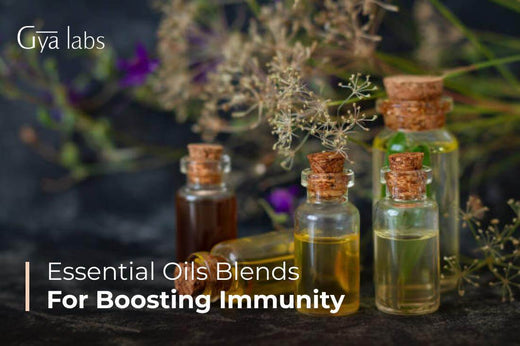When it comes to fitness, what happens after your workout is just as important as the workout itself. Post-workout recovery plays a crucial role in muscle repair, reducing soreness, and preventing injuries that could hinder your progress. This is where essential oils come in, a natural and effective way to soothe sore muscles and speed up recovery. The best part? You can easily incorporate essential oils into your post-workout routine through simple, easy-to-make blends.
Whether you’re dealing with muscle pain, stiffness, or fatigue, essential oils like peppermint, lavender, and eucalyptus offer powerful anti-inflammatory and pain-relieving properties that can help you bounce back faster. From soothing sore muscles to promoting mental relaxation, these oils can turn your recovery time into a refreshing and restorative experience.
In this guide, we'll dive into the best essential oils for post-workout recovery and show you how to create personalized essential oil blends that are perfect for relieving muscle pain and tension. You’ll learn how to use these oils in massages, baths, and even in your daily fitness routine to help you get the most out of your workouts.
10 Essential Oil Blends for Post-Workout Recovery
Cooling Peppermint and Eucalyptus Blend for Sore Muscles
Ingredients:
- 4 drops of peppermint essential oil
- 4 drops of eucalyptus essential oil
- 2 drops of lavender essential oil
- 1 tablespoon of carrier oil (jojoba or sweet almond oil)
Instructions:
- In a small bowl, mix the peppermint oil, eucalyptus oil, and lavender oil with the carrier oil.
- Stir well to combine.
How to Use:
Massage this blend onto sore muscles immediately after your workout to enjoy its cooling and soothing effects. Focus on areas that are particularly sore or tense, such as your legs, shoulders, or back.
Benefits:
- Peppermint oil provides a cooling relief, easing sore muscles and muscle tension.
- Eucalyptus oil helps reduce inflammation and improves circulation, accelerating recovery.
- Lavender oil soothes both the body and mind, promoting relaxation and sleep.
Warming Ginger and Marjoram Blend for Muscle Aches
Ingredients:
- 3 drops of ginger essential oil
- 5 drops of marjoram essential oil
- 3 drops of black pepper essential oil
- 1 tablespoon of carrier oil (jojoba or coconut oil)
Instructions:
- Combine the essential oils with the carrier oil in a small bowl or container.
- Stir the mixture to blend the oils.
How to Use:
Apply this warming blend to sore, aching muscles. It’s especially effective when used in a massage to help increase blood flow and ease stiffness.
Benefits:
- Ginger oil has anti-inflammatory properties that reduce muscle pain and stiffness.
- Marjoram oil relaxes muscles and relieves muscle spasms.
- Black pepper oil warms the muscles, increasing blood circulation and helping with faster recovery.
Soothing Lavender and Rosemary Blend for Tired Muscles
Ingredients:
- 5 drops of lavender essential oil
- 5 drops of rosemary essential oil
- 1 tablespoon of carrier oil (sweet almond oil or coconut oil)
Instructions:
- Mix the lavender and rosemary oils with the carrier oil in a small bowl.
- Stir until fully combined.
How to Use:
Massage this blend into your muscles after a workout to relieve soreness and promote relaxation. Focus on areas that feel tired or overworked.
Benefits:
- Lavender oil helps reduce inflammation, soothes sore muscles, and promotes relaxation.
- Rosemary oil improves circulation and helps reduce muscle pain and stiffness.
Eucalyptus and Black Pepper Blend for Joint Pain and Stiffness
Ingredients:
- 4 drops of eucalyptus essential oil
- 4 drops of black pepper essential oil
- 2 drops of lavender essential oil
- 1 tablespoon of carrier oil (jojoba oil or sweet almond oil)
Instructions:
- Combine the essential oils with the carrier oil in a bowl.
- Mix well until the oils are blended.
How to Use:
Massage this blend onto stiff or sore joints to relieve pain and stiffness. It’s great for use after intense workouts that cause joint discomfort.
Benefits:
- Eucalyptus oil reduces inflammation and helps with joint pain.
- Black pepper oil has warming properties that help reduce stiffness and promote flexibility.
- Lavender oil soothes soreness and calms the mind, promoting relaxation.
Relaxing Lavender and Peppermint Bath Soak
Ingredients:
- 5 drops of lavender essential oil
- 4 drops of peppermint essential oil
- 1 cup of Epsom salts
- 1 tablespoon of carrier oil (coconut oil)
Instructions:
- Add the essential oils and carrier oil to the Epsom salts and mix well.
- Stir the mixture into a warm bath.
How to Use:
Soak in this relaxing bath for at least 20 minutes after your workout to soothe sore muscles and calm your mind.
Benefits:
- Lavender oil relaxes the body and promotes faster muscle recovery.
- Peppermint oil provides a cooling, soothing sensation to tired muscles.
- Epsom salts are rich in magnesium, which helps reduce muscle aches and inflammation.
Invigorating Lemon and Peppermint Blend for Muscle Tension
Ingredients:
- 5 drops of peppermint essential oil
- 3 drops of lemon essential oil
- 2 drops of rosemary essential oil
- 1 tablespoon of carrier oil (jojoba or sweet almond oil)
Instructions:
- Mix the peppermint, lemon, and rosemary oils with the carrier oil in a small container.
- Stir well to ensure all oils are combined.
How to Use:
Gently massage this blend into areas of muscle tension after your workout, focusing on your neck, shoulders, or lower back.
Benefits:
- Peppermint oil offers a cooling effect to ease muscle tension.
- Lemon oil helps improve circulation and refreshes the body.
- Rosemary oil works to relieve muscle stiffness and tension, promoting flexibility.
Deep Relief Black Pepper and Ginger Blend for Chronic Pain
Ingredients:
- 4 drops of black pepper essential oil
- 3 drops of ginger essential oil
- 3 drops of eucalyptus essential oil
- 1 tablespoon of carrier oil (coconut or sweet almond oil)
Instructions:
- Combine all essential oils with the carrier oil in a small bowl.
- Mix thoroughly to blend the oils.
How to Use:
- Massage this warming blend into areas of chronic pain or soreness, such as the lower back or knees. It’s especially effective for easing muscle stiffness and joint pain.
Benefits:
- Black pepper oil helps improve circulation and warms the muscles to relieve stiffness.
- Ginger oil reduces inflammation and soothes deep muscle aches.
- Eucalyptus oil helps ease pain while also reducing inflammation in the joints and muscles.
Soothing Lavender and Frankincense Blend for Relaxation and Recovery
Ingredients:
- 5 drops of lavender essential oil
- 3 drops of frankincense essential oil
- 2 drops of marjoram essential oil
- 1 tablespoon of carrier oil (jojoba or coconut oil)
Instructions:
- Mix all the essential oils with the carrier oil in a small container.
- Stir well to combine.
How to Use:
Apply this blend to your muscles and joints after a workout to help reduce soreness and promote mental relaxation. It’s ideal for an end-of-day recovery routine.
Benefits:
- Lavender oil calms both the body and mind, promoting faster recovery.
- Frankincense oil aids in reducing inflammation and boosts healing in overworked muscles.
- Marjoram oil relaxes muscle tension and relieves muscle spasms.
Refreshing Peppermint and Bergamot Blend for Cooling Relief
Ingredients:
- 4 drops of peppermint essential oil
- 3 drops of bergamot essential oil
- 3 drops of eucalyptus essential oil
- 1 tablespoon of carrier oil (jojoba or coconut oil)
Instructions:
- Combine all essential oils with the carrier oil in a small bowl or container.
- Mix thoroughly to create a soothing, refreshing blend.
How to Use:
Massage this cooling blend into tired muscles after an intense workout. It’s great for use during hot weather when your body needs extra cooling.
Benefits:
- Peppermint oil provides a cooling sensation that helps reduce muscle soreness.
- Bergamot oil uplifts your mood while soothing muscle aches.
- Eucalyptus oil relieves muscle tension and promotes healing.
Anti-Inflammatory Turmeric and Rosemary Blend for Joint Pain
Ingredients:
- 4 drops of turmeric essential oil
- 4 drops of rosemary essential oil
- 2 drops of lavender essential oil
- 1 tablespoon of carrier oil (sweet almond oil or jojoba oil)
Instructions:
- Mix the turmeric, rosemary, and lavender oils with the carrier oil in a small bowl.
- Stir well to blend all the oils.
How to Use:
Apply this anti-inflammatory blend to areas where you experience joint pain or stiffness, such as the knees or elbows, and massage gently.
Benefits:
- Turmeric oil offers powerful anti-inflammatory properties that help reduce joint pain and swelling.
- Rosemary oil improves blood circulation and eases stiffness.
- Lavender oil adds a calming element, reducing inflammation and soothing soreness.
The Best Essential Oils for Post-Workout Recovery
When it comes to soothing sore muscles and speeding up recovery, there are a few key essential oils that stand out. These essential oils offer anti-inflammatory, analgesic, and relaxing properties, making them ideal for post-exercise care. Let's take a closer look at 5 essential oils that are particularly effective for post-workout recovery:
Peppermint Essential Oil
Peppermint oil is well-known for its cooling and soothing effects on sore muscles. Its high menthol content provides a natural analgesic that helps relieve muscle pain and tension, making it one of the best essential oils for post-workout recovery.
Lavender Essential Oil
Lavender oil is famous for its calming and anti-inflammatory properties. It’s one of the best essential oils for soothing sore muscles and relaxing the mind after a tough workout. Lavender oil can also help with joint pain and muscle soreness, promoting faster recovery.
Eucalyptus Essential Oil
Eucalyptus oil has anti-inflammatory and pain-relieving properties that make it ideal for sore muscles and aches. It also helps improve blood circulation, which can speed up the muscle recovery process.
Marjoram Essential Oil
Marjoram oil is known for its ability to relieve muscle spasms and tension. It’s a warming oil that promotes relaxation and eases muscle pain, making it perfect for post-workout massage blends.
Ginger Essential Oil
Ginger oil is a powerful anti-inflammatory essential oil that can help reduce muscle pain, stiffness, and soreness. Its warming properties make it great for relieving deep muscle aches and boosting blood circulation after exercise.
How Essential Oils Help in Post-Workout Recovery
Essential oils have long been used for their therapeutic properties, and when it comes to post-workout recovery, they offer a natural and effective way to soothe sore muscles, reduce inflammation, and promote relaxation. Whether you’re recovering from a high-intensity workout or a long cardio session, the right essential oils can speed up your recovery process and make you feel rejuvenated faster.
Here are some ways essential oils help in post-workout recovery:
Relieve Muscle Soreness and Pain
One of the most common issues after a workout is muscle soreness, which results from microscopic tears in the muscle fibers. Essential oils like peppermint, lavender, and eucalyptus contain analgesic and anti-inflammatory properties that help relieve muscle pain and soothe soreness. Peppermint oil, with its high menthol content, provides a cooling effect, helping to numb the pain and reduce muscle tension. Meanwhile, lavender oil offers gentle relaxation, reducing both pain and mental stress.
Reduce Inflammation
After intense exercise, your muscles and joints may become inflamed due to the stress placed on them. Essential oils such as ginger, turmeric, and rosemary have potent anti-inflammatory properties that help reduce swelling and inflammation, which is crucial for faster muscle repair. Turmeric oil is especially effective at reducing inflammation in joints, helping to alleviate stiffness and pain associated with heavy workouts.
Promote Relaxation and Sleep
Post-workout recovery isn’t just about addressing physical soreness—it’s also about mental recovery. Relaxation plays a key role in muscle recovery, and essential oils like lavender and frankincense are known to calm the nervous system, reduce stress, and promote restful sleep. Sleep is when your body repairs muscles, so using these oils before bed can enhance your overall recovery process.
Improve Circulation
Increased blood flow to the muscles after a workout is vital for delivering nutrients and oxygen needed for muscle repair. Essential oils such as rosemary, black pepper, and eucalyptus help improve blood circulation, ensuring that your muscles receive the nutrients they need to recover effectively. Eucalyptus oil not only boosts circulation but also acts as a decongestant, helping you breathe more easily after an intense workout.
Combat Muscle Stiffness and Spasms
Muscle stiffness and spasms are common post-workout issues, especially after strength training or long endurance activities. Essential oils like marjoram and ginger work wonders in reducing muscle stiffness by increasing warmth and promoting relaxation. Marjoram oil is particularly known for its ability to reduce muscle spasms and tension, making it perfect for massaging sore muscles after a workout.
Speed Up Muscle Repair
Post-workout recovery is not just about soothing pain; it’s about actively supporting muscle repair. Essential oils like frankincense and lavender promote cellular regeneration, helping your muscles heal faster. The quicker your muscles repair, the sooner you can get back to your fitness routine without soreness or fatigue.
Provide Mental Clarity and Focus
Post-workout fatigue can affect both your body and mind. Essential oils such as peppermint and rosemary are known for their ability to enhance mental clarity and focus. After a workout, these oils can refresh your senses, reduce mental fog, and improve your energy levels, allowing you to stay productive throughout the day.
Risks and Precautions of Using Essential Oils
While essential oils offer numerous benefits for post-workout recovery, it’s important to recognize that they are highly concentrated substances and must be used with caution. When not used properly, essential oils can cause adverse effects. Here are some key risks and precautions to consider:
Skin Irritation and Sensitivity
Essential oils can cause skin irritation, particularly when applied undiluted. Oils like peppermint, cinnamon, and clove are known to be more potent and may lead to burning, redness, or rashes if not properly diluted. Always dilute essential oils with a carrier oil (such as jojoba oil, coconut oil, or sweet almond oil) before applying them to the skin. A general guideline is to mix 2-3 drops of essential oil per tablespoon of carrier oil.
Photosensitivity
Some essential oils, especially citrus oils like lemon, lime, and bergamot, can increase the skin’s sensitivity to sunlight. This can result in sunburns, skin discoloration, or blisters if exposed to direct sunlight after application. It’s essential to avoid applying these oils to exposed skin before heading outdoors. If you’re using a photosensitive oil, wait at least 12 hours before sun exposure.
Allergic Reactions
Essential oils can cause allergic reactions in some individuals. Common symptoms include itching, swelling, and respiratory issues. To minimize the risk, always perform a patch test before using a new essential oil. Apply a diluted amount of the oil to a small area of skin (such as your forearm) and wait 24 hours to check for any reactions.
Toxicity and Overuse
Certain essential oils, such as wintergreen and camphor, are toxic if ingested or used in large amounts. Even when used topically or aromatically, overuse of essential oils can lead to headaches, nausea, or dizziness. Always follow recommended guidelines for dosage and avoid excessive use.
Interactions with Medications
Some essential oils can interact with medications or exacerbate certain medical conditions. For instance, eucalyptus oil can interfere with certain asthma medications, and lavender oil can enhance the sedative effects of medications for sleep or anxiety. If you are on medication or have any underlying health conditions, consult with a healthcare provider before using essential oils.
Pregnancy and Breastfeeding
Not all essential oils are safe for use during pregnancy or breastfeeding. Oils like clary sage, rosemary, and peppermint should be avoided during pregnancy as they may stimulate contractions or affect hormone levels. If you are pregnant or nursing, consult with a healthcare professional before using essential oils.
Proper Storage and Handling
Essential oils should be stored in a cool, dark place in tightly sealed glass bottles, as exposure to heat, light, or air can degrade their potency. Additionally, keep essential oils out of reach of children and pets to prevent accidental ingestion or misuse.
Conclusion
In conclusion, essential oils play a powerful role in post-workout recovery by providing natural relief for sore muscles, aches, and pains. Whether used in aromatherapy or applied topically, these pure essential oils are known to help ease muscle soreness and speed up recovery.
You can add a few drops of your favorite essential oils to a carrier oil like jojoba or coconut oil to create a soothing massage oil that can be used to relieve back pain, muscle stiffness, or general soreness. When applied topically, oils such as peppermint, lavender, and eucalyptus can help reduce inflammation and ease swelling.
For more targeted pain relief, a warm compress towel infused with essential oils can provide deep relaxation and relief to sore areas. Simply add a few drops of essential oils for sore muscles to a towel, heat it slightly, and apply it to the affected area for comfort. Alternatively, you can inhale these oils directly from the bottle or add them to a diffuser to calm both your body and mind, providing an all-around recovery boost after your workouts.
Whether you are dealing with sore muscles from an intense training session or looking for natural remedies to complement your fitness journey, essential oils offer a holistic approach to wellness. Oils such as ginger, black pepper, and rosemary not only help boost circulation but are also effective in treating chronic pain, such as back pain, when used regularly. Incorporating these oils into your daily routine, whether through aromatic methods or topical applications, can help you recover faster, soothe muscle soreness, and improve overall well-being.















